‘Door to Freedom’: Dr. Meryl Nass Takes on the WHO With Launch of New Nonprofit
Dr. Meryl Nass launched the Door to Freedom nonprofit and website to educate the public and encourage them to take action about what she called a “global coup” by the World Health Organization.
This article was originally published by The Defender — Children’s Health Defense’s News & Views Website.
Dr. Meryl Nass, an internist and biological warfare expert with a long history of investigating public health threats is sounding the alarm about the World Health Organization’s (WHO) proposed changes to global health governance.
To fight what she sees as an attempted “global coup” by the WHO, Nass has launched the Door to Freedom nonprofit and website to educate the public about the issues at stake and to encourage people to take action.
The site provides resources to help people understand and take action on the WHO’s proposed amendments to the International Health Regulations (IHR) and its new “pandemic treaty.” Both instruments could dramatically expand the organization’s power and reach and undermine national sovereignty and individual rights, Nass said.
The Door to Freedom website provides an eight-page summary on “Why is Everyone Concerned About the WHO?” and an in-depth article — “The WHO’s Proposed Treaty Will Increase Man-Made Pandemics” — by Nass. It also hosts handouts in more than a dozen languages.
The WHO’s health proposals are unrolling more quickly than most people expect, Nass warned in a recent presentation. These are not just being pushed by the WHO “but by basically all international organizations,” she said.
Nass highlighted the May 27-June 1 United Nations (U.N.) World Health Assembly gathering, during which representatives of the 194 member states of the WHO will vote on the amendments and treaty.
Nass believes U.S. state legislatures can play a key role in countering the WHO’s “global coup,” by passing resolutions rejecting the WHO’s proposals. Door to Freedom has created this model resolution, and Nass urges anyone with connections to state legislators to contact her.
“We would love to have declarations from the governors about this as well, because it’s a 10th Amendment issue for them, too,” she said. Under the 10th Amendment, the “powers not delegated to the United States by the Constitution, nor prohibited by it to the States, are reserved to the States respectively, or to the people.”
Nass also encouraged people to write to their state attorneys general and elected representatives to help shed light on the WHO proceedings and their implications.
Nass created a summary document on the WHO’s proposed amendments and treaty. She also created presentations that contain images pulled directly from the WHO, the U.N., the European Union (EU) and related websites.
She has spoken to elected representatives in Washington, D.C., and in eight European countries over the past three months. She said the images in her presentations helped convince people that an attempted globalist takeover, using public health as a Trojan horse, “is really happening.”
WHO demands nations ‘surveil, censor and propagandize their citizens’
According to Nass, the WHO’s proposed IHR amendments and pandemic treaty would make the organization’s recommendations legally binding on WHO member states, which include the U.S.
“What used to be recommendations will be binding,” she said, with “WHO creating committees that will make sure countries carry out its orders” and member states passing WHO-recommended laws.
To make sure this happens, WHO is demanding that nations “surveil, censor and propagandize their citizens,” said Nass.
Countries will be expected to conduct extensive biological surveillance, including gathering and sharing citizens’ medical records — potentially even nasal swabs — with the WHO, purportedly so that pandemics can be identified earlier.
Nass pointed to specific proposals requiring states to monitor and censor mainstream and social media to combat “false and unreliable information” about WHO-designated public health and share citizens’ medical records and social media content with the WHO.
Under the proposed changes, “WHO’s unelected officials (Director-General, Regional Directors, technical staff) could dictate measures including quarantines, testing and vaccination requirements, lockdowns, border closures” with member states required to comply, according to Nass.
Yet these officials “would not be accountable for their decisions” and would continue to enjoy diplomatic immunity, she said.
All nations must seek out ‘potential pandemic pathogens’
One of the most concerning aspects of the WHO’s proposed changes is the requirement for nations to seek out “potential pandemic pathogens” and share them widely, Nass said.
The proposed IHR amendments would obligate states to transfer genetic sequence data for “pathogens capable of causing pandemics and epidemics or other high-risk situations” to other nations or third parties, despite the risks involved, according to Nass.
The data on pathogens is to be shared with universities, research centers and pharmaceutical companies in an online “biohub.”
This is nothing less than gain-of-function research, which the WHO only skirted around mentioning until recently, Nass said, but definitively named in a February draft of the treaty.
“This could also be called ‘proliferation of biological weapons agents,’ which is generally considered a crime,” she said.
Nass noted that the U.S. Centers for Disease Control and Prevention’s Select Agent Program, which manages dangerous pathogens with pandemic potential, “receives 200 reports yearly of accidents, losses or thefts of potential pandemic pathogens from high containment labs” in the U.S.
This amounts to four reports — and four potential pandemics — per week.
“When the WHO demands that every nation start doing this … you know there will be many accidents,” Nass said.
WHO using ‘misleading language and lies,’ secretive proceedings
According to Nass, the WHO deliberately uses deceptive language and false claims to advance its proposed IHR amendments and pandemic treaty, making it difficult for people to grasp the real consequences.
“The WHO is lying about what’s in them and calling us — those of us who call them out — liars,” she said.
Nass said the WHO gave politicians, ministers and public servants in all countries bullet points to help maintain the narrative.
In a recent U.S. House of Representatives hearing on the WHO pandemic treaty, Nass said U.S. officials “basically … just lied about the content of these documents.”
She provided several examples of the WHO’s misleading statements and “verbal methods to distract from, to misidentify, to misguide everybody about what they’re trying to do.”
The WHO’s central lie is that the pandemic treaty and changes to the IHR will not undermine national sovereignty when its proposals state otherwise.
WHO Director-General Tedros Adhanom Ghebreyesus said the proposed documents are being written by the member states — not the WHO. However, the WHO admitted that “non-state actors in official relations with the WHO,” such as the Clinton Foundation, the Bill & Melinda Gates Foundation and the World Bank, are helping negotiate and draft the documents, Nass said.
The WHO justifies its proposed sweeping new powers under the guise of public health while further entrenching Big Pharma interventions and diminishing its product liability, Nass said.
The “One Health” approach — touted by the WHO as a way to prevent, detect and respond to pandemics — is another example of misleading language, according to Nass.
“It remains unclear what this strategy is, and there is no evidence to support the claim that One Health offers any public health advantages whatsoever,” Nass said.
Nass said the WHO has failed so far to handle pandemics. She also suggested pandemics cannot be controlled. Outside of man-made pathogens, most natural viruses are not as dangerous as advertised and their impacts can be mitigated for most people with inexpensive and widely available therapeutics, she said.
The WHO is also being secretive about its proceedings, Nass said. “We have not seen the negotiated IHR amendments since late 2022 despite continuous work on them for 15 months.”
Most of the WHO’s work happens in committees “using so-called consensus procedures in which no one knows what the majority of member states actually support or reject,” she said.
The voting buttons on the desk of each member are often deliberately not used, according to Nass.
Instead, “‘Secret ballots’ can be cast and then are removed … for a secret count,” she said. “Or votes are omitted altogether, as appears to have happened with the 2022 IHR amendments.”
Citing these and other irregularities, Substack journalist James Roguski on March 7 published “An Open Letter To Tedros,” authored by Silvia Behrendt, Ph.D., founder of Global Health Responsibility Agency, stating the WHO was “violating a procedural obligation in the amendment process” of the IHR.
Roguski encouraged readers to send the letter to their elected representatives, directors of health agencies and the media, telling them that “no amendments can [legally] be adopted by the 77th World Health Assembly in May 2024.”
‘One Health’: A ‘word salad’ to expand WHO power
The WHO and other international organizations are using the “One Health” concept to justify a massive expansion of the WHO’s authority and scope, according to Nass.
While “One Health” has been around for 20 years and is even embedded in some U.S. legislation, such as the 2023 National Defense Authorization Act, Nass said the language is meaningless.
“It is a word salad,” she said. “It has no meaning except that it wraps up humans, animals, plants and ecosystems into the range of things related to health that the WHO can take authority over.”
Despite the lack of a clear definition or evidence of public health benefits, Nass said the “One Health” concept has spread rapidly due to the enormous amount of money being spent to promote it.
“There are thousands of people … following the ‘One Health’ approach,” she said. “Nobody’s been able to figure out how it benefits anyone, but enough billions of dollars have been spent that it’s embedded everywhere.”
Nass pointed to a Lancet editorial stating that “One Health” represents “a fundamentally different approach to the natural world, one in which we are as concerned about the welfare of non-human animals and the environment as we are about humans.”
The true goal of expanding the “One Health” framework to cover all humans, animals, plants and ecosystems, Nass said, is to enable “global governance” by the WHO and its backers.
Global health power grab extends beyond WHO
The push for centralized global health governance is not limited to the WHO, Nass said. Other major international bodies like the EU, G20, U.N. and the World Bank are advancing similar agendas.
Nass highlighted a brochure published by the EU last year outlining its pandemic preparedness strategy, which openly calls for “global governance with the World Health Organization at its core.”
The EU document advocates for a legally binding pandemic agreement, the “One Health” approach, strengthened international health regulations, and expanded surveillance and genomic sequencing of pathogens by all nations — all key components of the WHO’s controversial proposals.
Nass said some countries in and around Europe are showing signs of resistance to the WHO proposals, but she declined to identify them over concerns the European Central Bank could curb debt-laden countries’ dissent with threats of financial harm, such as interest rate hikes or calling in loans.
Nass noted that the G20, a forum of the world’s 20 largest economies, is also pushing for the same policies and is “open about the fact they’re interested in global governance.”
She pointed to a series of policy documents issued by the U.N. over the past year seeking to establish an “emergency platform” that would give the secretary-general the ability to declare a wide range of emergencies, including pandemics and biological threats, and “automatically” assume special powers to manage the response.
The World Bank has also jumped on the bandwagon, launching a billion-dollar “pandemic prevention, preparedness, and response” financing system aligned with the WHO’s international health regulations.
U.S. pandemic preparedness push: costly and ineffective?
The Biden administration’s proposed budget for fiscal year 2024 includes tens of billions of dollars for pandemic preparedness and response efforts that closely mirror the WHO’s controversial plans, Nass said.
The U.S. Department of Health and Human Services alone requested $20 billion for its pandemic initiatives, with additional funding sought by other federal agencies, Nass said. The Biden administration in 2022 earmarked $88 billion “for pandemic preparedness and biodefense.”
The White House claims this massive investment will “save trillions of dollars and millions of lives” in the event of a future pandemic. However, Nass said the U.S. government has failed to demonstrate its ability to effectively prevent, detect or respond to such threats.
“So they want to figure out how to detect them,” she said. “They want to deploy new technologies that don’t exist.”
The administration is hoping that by collecting vast troves of citizens’ hospital and medical records, they might gain some marginal advantage in identifying outbreaks more quickly, according to Nass.
She dismissed this as a false hope. “They want to share all those medical records internationally” — a key demand of the WHO — and are “relying on modeling to justify everything.”
Nass said before COVID-19, the U.S. was already spending around $10 billion per year on pandemic preparedness, yet still found itself critically short of masks, gloves, gowns, drugs and other essential supplies when the virus struck.
“Why would we expect a central WHO authority, which relies on vested interests for 85% of its funding, to do any better?” she asked.
This article was written by John-Michael Dumais and originally published by The Defender — Children’s Health Defense’s News & Views Website under Creative Commons license CC BY-NC-ND 4.0. Please consider subscribing to The Defender or donating to Children’s Health Defense.
If you find value in this Substack and have the means, please consider making a contribution to support the World Council for Health. Thank you.

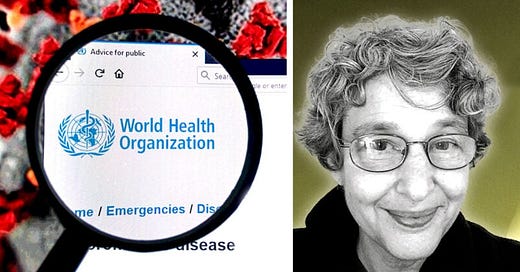



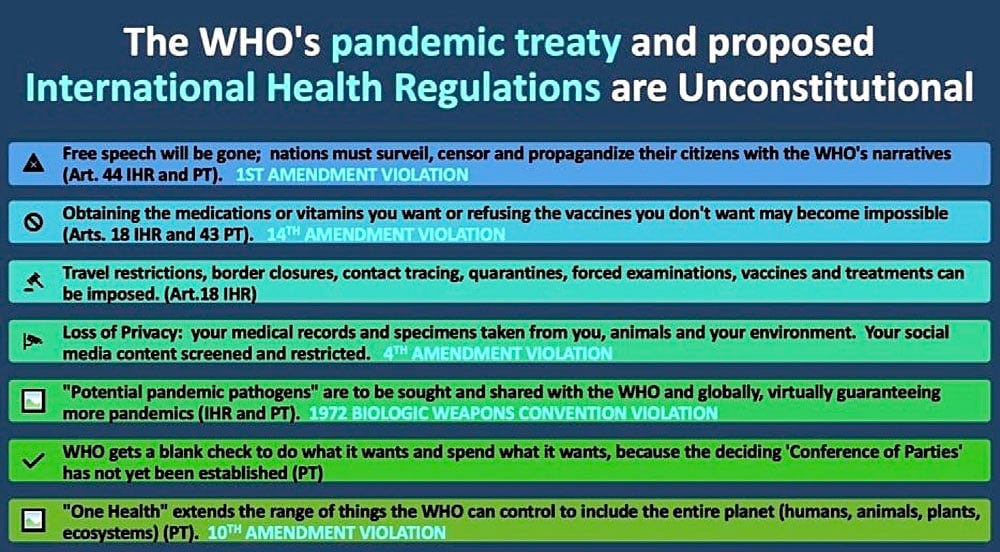

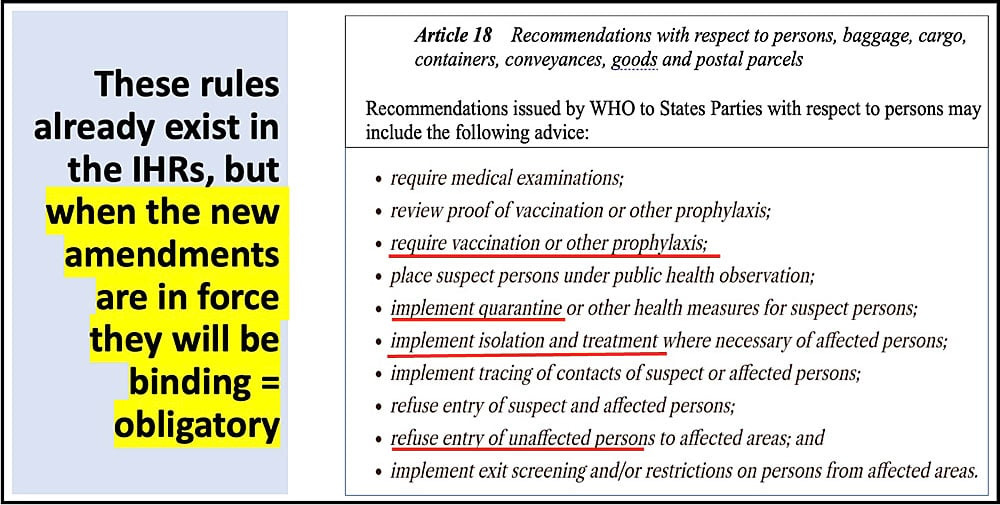
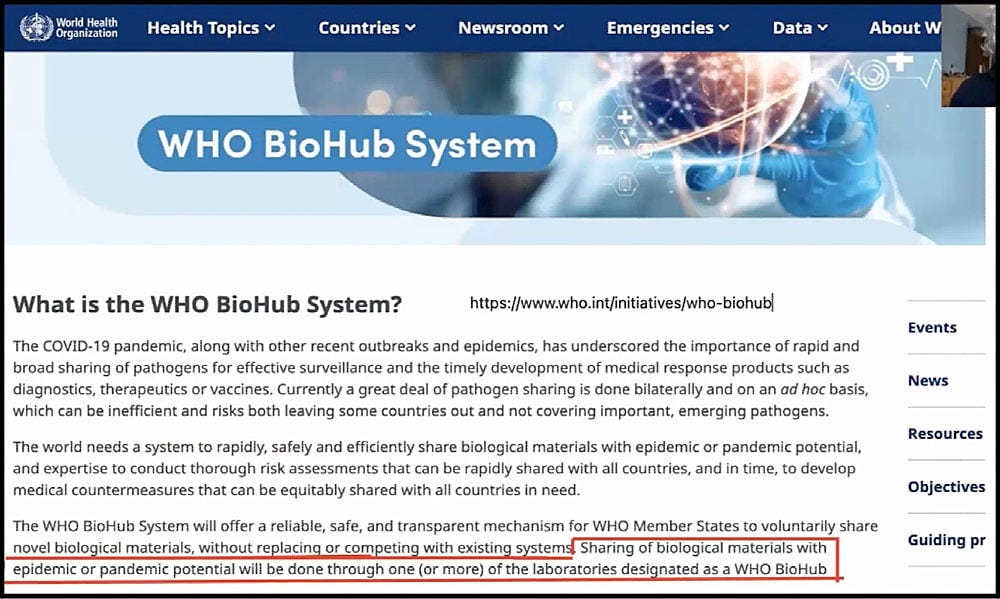
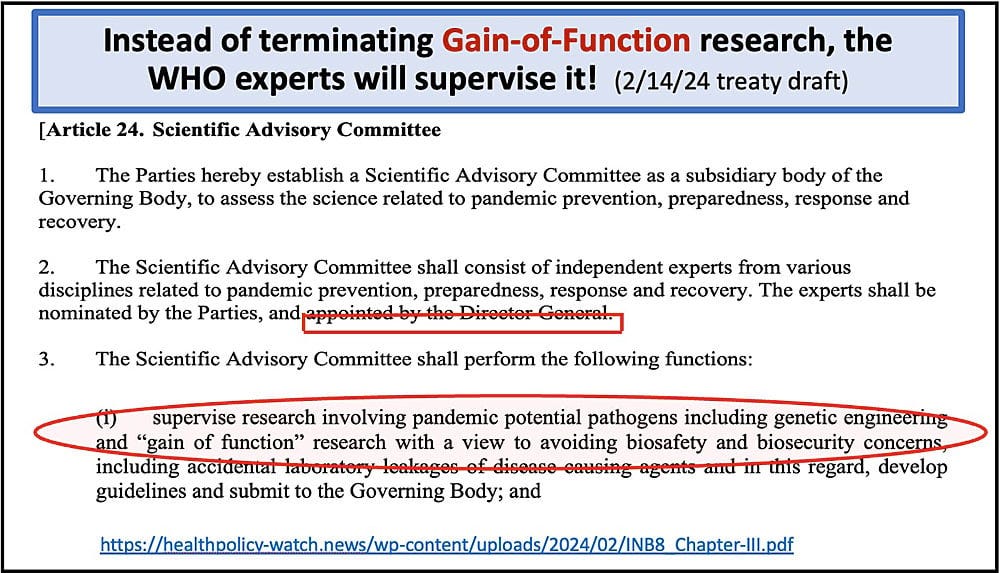
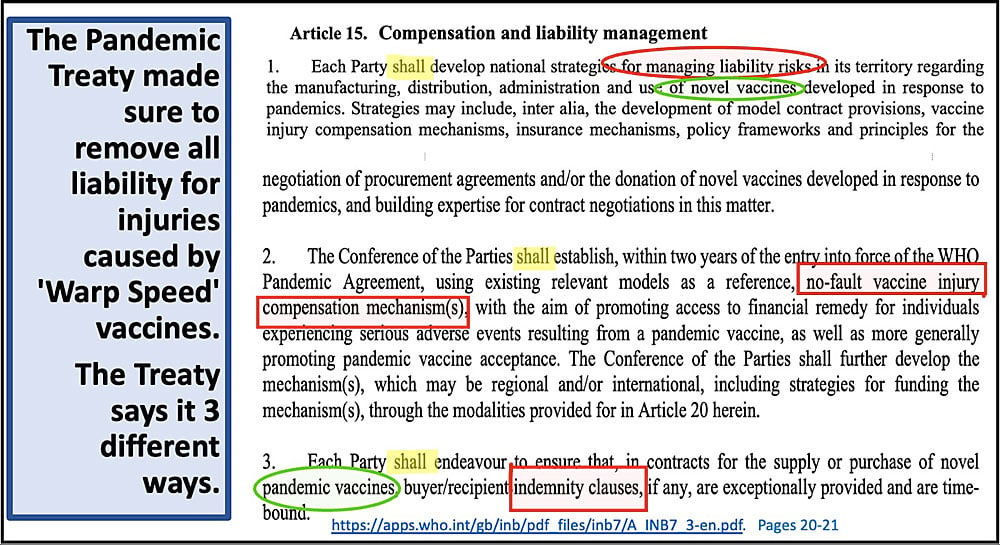
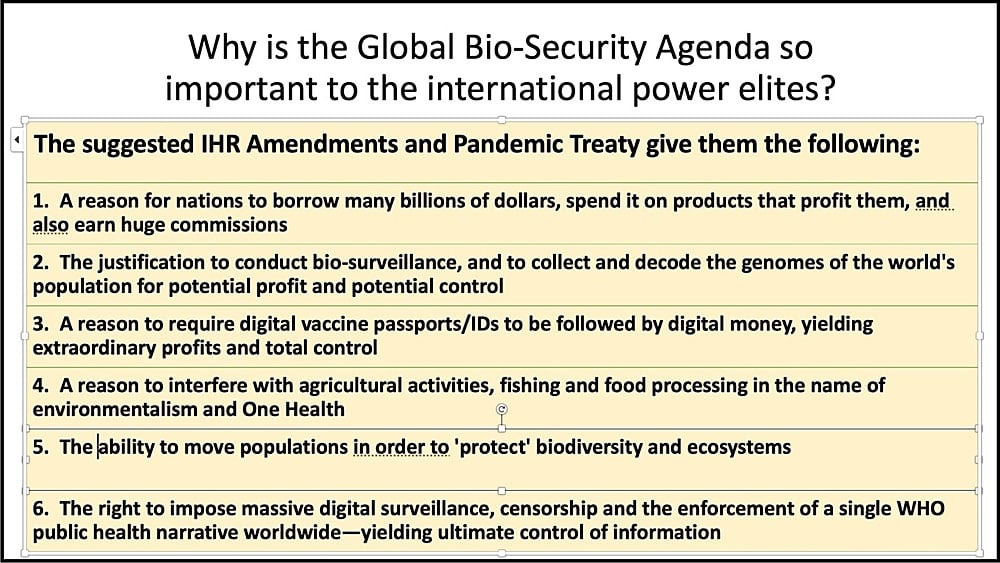
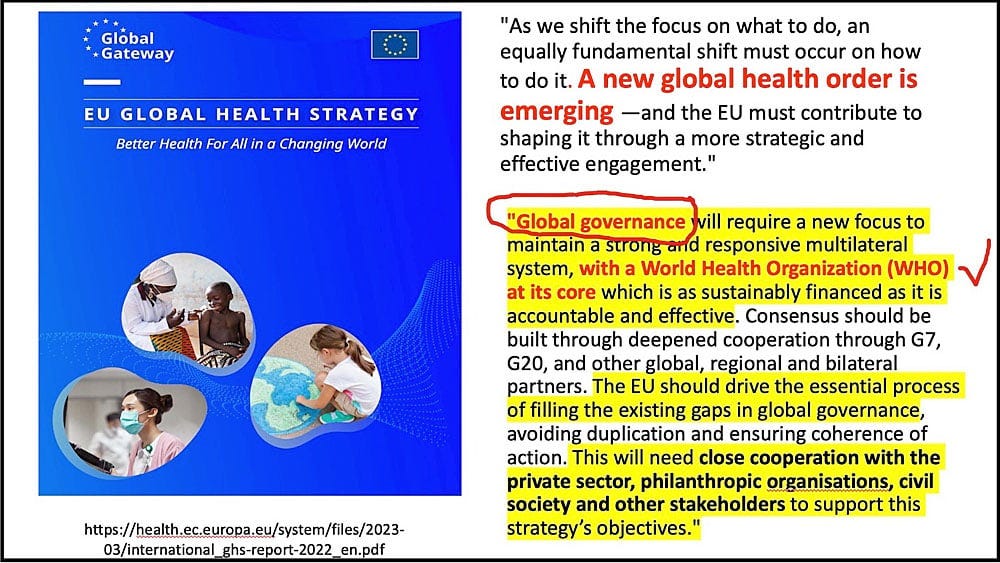
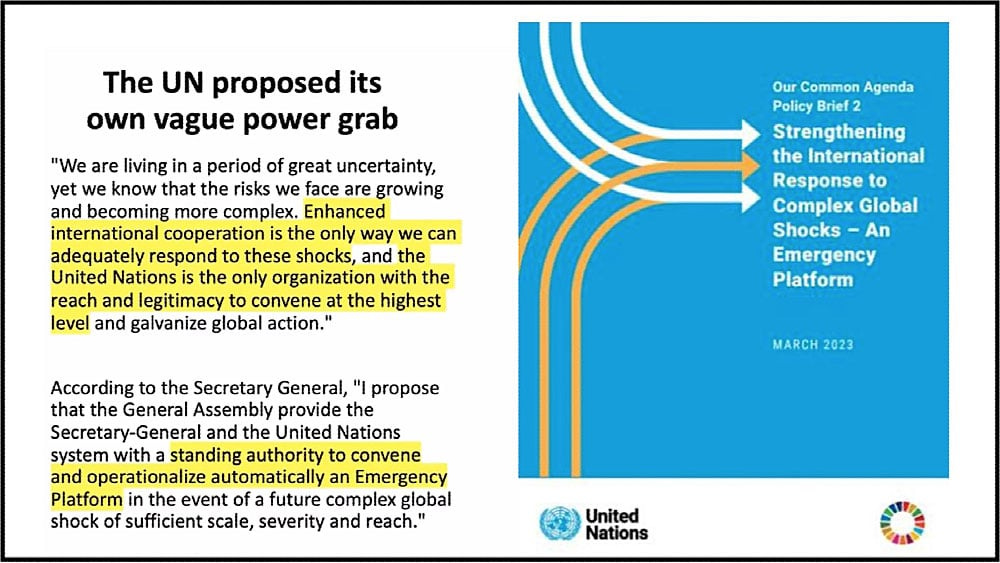


Well Australia better wake up here, with all these distractions going on to what's going on before our backs in Governments here, and in The Major Parties that lie and people do not have a stuffing clue to the real Reality what's coming.
They emphasised concerns about the alleged voluntary nature of the scheme, its security, and its treatment of privacy and rights. Digital Rights Watch also expressed concerns about the misuse of personal and biometric data, law enforcement access, and the potential for discrimination and surveillance.
Community Voice Australia also outlined its concerns about the Digital ID Bill 2023, including the potential for function creep, involuntary digital ID implementation, privacy breaches, and increased surveillance. Their submission highlighted issues such as the voluntary nature of digital ID being undermined by exemptions, the broad accreditation scheme allowing private entities to issue digital IDs, and the risk of marginalised groups being excluded or subjected to surveillance. Community Voice Australia warned of a future where access to services and goods, including employment and social benefits, could be contingent on having a digital ID, raising ethical, privacy, and societal implications.
In total, the Senate Economics Legislations Committee inquiry into the Digital ID Bill 2023 and the associated Digital ID (Transitional and Consequential Provisions) Bill 2023 received almost 400 submissions. About 350 of these submissions were by everyday Australians expressing their concerns about how this bill will impact their lives and how it could affect their privacy.
Alarmingly, the Senate Economics Legislation Committee ignored these concerns and recommended passing the bill.
Of note is the excellent dissenting report by Australian Greens Senators who were part of the Senate Economic Legislations Committee's inquiry into these Digital ID bills. The Greens Senators pointed out that the Digital ID bills could exclude those without digital literacy or access from essential services. They also cautioned against voting for the bills ahead of necessary privacy protections being put in place. The Greens rightly criticised the bills for potentially allowing law enforcement excessive access to personal information, undermining public confidence, and failing to ensure a digital ID system was genuinely voluntary and inclusive. They also raised concerns about biometrics and data profiling, pointing out that these practices might replicate existing biases and prejudices by public agencies and private corporations.
While some might suggest that there could be amendments made to improve the Digital ID bills, it will take significant time, more public consultation and extensive redrafting to allay concerns raised by many reputable organisation about how these bills undermine the privacy and rights of Australian citizens.
We appreciate your strong track record of listening to community concerns and prioritising privacy and human rights over ideological considerations.
As a key crossbench Senator, we respectfully request that you take another brave stand for the privacy and rights of the Australian people and reject the Digital ID Bill 2023 and the associated Digital ID (Transitional and Consequential Provisions) Bill 2023.
Kind regards,
DEFEAT DIGITAL ID!
Auatralians gave a choice yet a lot know not what's going on because of ignorance to true facts, just going about life as if nothing's going on.